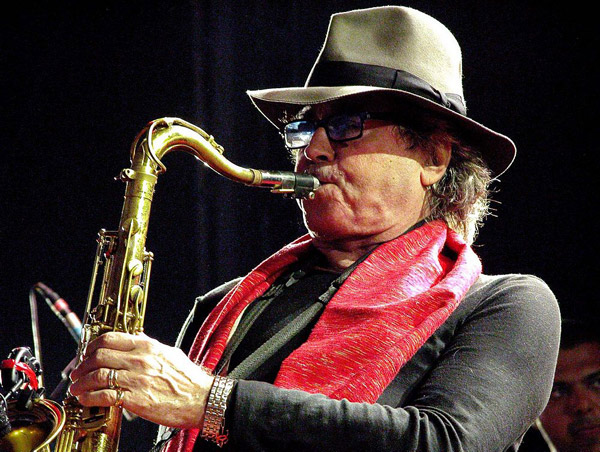Argentinian jazz master Gato Barbieri dead at 83
 Latin jazz saxophonist Leandro "Gato" Barbieri, who composed the Grammy-winning music for the Marlon Brando film Last Tango in Paris and recorded dozens of albums over a career spanning more than seven decades, has died. He was 83.
Latin jazz saxophonist Leandro "Gato" Barbieri, who composed the Grammy-winning music for the Marlon Brando film Last Tango in Paris and recorded dozens of albums over a career spanning more than seven decades, has died. He was 83.
Laura Barbieri, his wife, said her husband died Saturday, 4/2/2016 in a New York hospital from pneumonia. The musician recently had bypass surgery to remove a blood clot. Though in poor health, Barbieri, still sporting his trademark black fedora hat, had been performing monthly at the Blue Note jazz club in New York, since 2013. He last performed at the club on November 23th.
Born on November 28th, 1932, in Rosario, Argentina, Barbieri grew up in a family that included several musicians, but did not take up an instrument until he was 12 when he heard bebop pioneer Charlie Parker's recording of "Now's the Time" and began studying clarinet. After moving to Buenos Aires in 1947, he picked up the alto saxophone. He earned the nickname "El Gato" (The Cat) in the 50s because of the way he scampered between clubs with his saxophone. He gained national prominence in Argentine playing alto saxophone in the orchestra of Lalo Schifrin, the pianist and composer who later made a big impact with his TV and film scores, including Theme from Mission: Impossible. Later in the 1950s, Barbieri switched to tenor saxophone as he began leading his own groups.
In the 1960s, splitting his time between Rome and New York, he became part of the free jazz revolution, working extensively with trumpeter Don Cherry. Influenced by other modern jazz saxophonists he developed a warmer, grittier sound on the tenor. He recorded and performed with such avant-garde jazz musicians as Cherry, Carla Bley and Mike Mantler. But he soon rediscovered his roots, incorporating South American rhythms, harmonies and melodic themes on albums starting with The Third World in 1969 and eventually developed his own contemporary jazz sound.
After releasing the Last Tango album in 1972, Barbieri signed with the Impulse! label, releasing a series of mellower Latin-infused soul-jazz and jazz-pop albums, including Caliente! (1976), which included his rendition of Carlos Santana's "Europa", and four Chapter albums, which explored Brazilian, Afro-Cuban and Argentine rhythms. He recorded new material consistently until 1982, when a dispute with his record label led him to focus solely on touring. He recorded only intermittently in the 1980s, and did not release any albums in the period 1988-97. He released Que Pasa in 1997 after dealing with the turmoil of losing his Italian-born wife of 35 years to a degenerative illness in January 1995, and then undergoing triple bypass heart surgery two months later. He had to recover physically and overcome depression at the death of his wife to finish the album, which he credited with being a healing force.
Barbieri would release only three more albums over the rest of his life - including The Shadow of the Cat in 2002, a Latin-flavored smooth jazz session featuring guest trumpeter Herb Alpert, and New York Meeting in 2010 on which he played straight-ahead jazz standards, such as Thelonious Monk's "Straight, No Chaser" and Miles Davis' "So What".
Barbieri married again in 1996 and had a son, Christian.